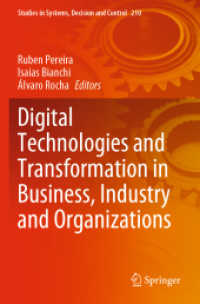- ホーム
- > 洋書
- > 英文書
- > Computer / Languages
Full Description
The aim of software engineering is to find methods for developing high quality software products at a reasonable cost. As more and more computers are being used in areas in which a malfunction of the system can be a source of serious losses or disturbances to the functioning of the society, the quality of software becomes a more and more critical factor of business success, human security, and safety. Examples of such application areas are enterprise management, public administration, and social insurance or post delivery services. The quality of services offered to the society depends on the quality of software systems that support the functioning of the respective public or private organizations (service providers).
Software engineering consists of a selection of methods and techniques that vary from project to project and evolve in time. The purpose of this volume is to provide an overview of the current work in software development techniques that can help with enhancing the quality of software. The chapters of this volume, organized by key topic area, create an agenda for the IFIP Working Conference on Software Engineering Techniques, SET 2006. The seven sections of the volume address the following areas: software architectures, modeling, project management, software quality, analysis and verification methods, data management, and software maintenance.
Contents
Software architectures and implementation technologies.- From Hubs Via Holons to an Adaptive Meta-Architecture — the "AD-HOC" Approach.- A C++ Workbench with Accurate Non-Blocking Garbage Collector for Server Side Internet Applications.- Scenario-based Component Behavior Filtration.- Mobile Ambients in Aspect-Oriented Software Architectures.- The architecture of distributed systems driven by autonomic patterns.- Modeling.- An optimizing OCL Compiler for Metamodeling and Model Transformation Environments.- Crossing the Borderline — From Formal to Semi-Formal Specifications.- Modeling of Component-Based Self-Adapting Context-Aware Applications for Mobile Devices.- A Performance Analysis Infrastructure for Component-Based System Hosted by Middleware.- Estimation of mean response time of multi-agent systems.- Integrated Approach to Modelling and Analysis using RTCP-nets.- Hybrid modeling and verification of Java based software.- Project management.- An evolutionary approach to project management process improvement for software-intensive projects.- Improved Bayesian Networks for Software Project Risk Assessment Using Dynamic Discretisation.- Software Risk Management: a Process Model and a Tool.- Software Quality.- An Approach to Software Quality Specification and Evaluation (SPoQE).- Feedback from Users on a Software Product to Improve Its Quality in Engineering Applications.- Reaching and Maintaining High Quality of Distributed J2EE Applications — BeesyCluster Case Study.- Verification methods.- Automatic software validation process.- j2eeprof — a tool for testing multitier applications.- An Analysis of Use Case Based Testing Approaches Based on a Defect Taxonomy.- Minimizing Test Execution Time During Test Generation.- An Integrated Regression TestingFramework to Multi-Threaded Java Programs.- DynAlloy as a Formal Method for the Analysis of Java Programs.- Verification of UML State Diagrams Using Concurrent State Machines.- Aspect-oriented Response Injection: an Alternative to Classical Mutation Testing.- Advanced mutation operators applicable in C# programs.- Data management.- An Open Platform of Data Quality Monitoring for ERP Information Systems.- Managing Data from Heterogeneous Data Sources Using Knowledge Layer.- Checkpoint-based resumption in data warehouses.- Software maintenance.- A C++ Refactoring Browser and Method Extraction.- ESC/Java2 as a Tool to Ensure Security in the Source Code of Java Applications.- Formalizing Software Refactoring in the Distributed Environment by aedNLC Graph Grammar.- Minik: A Tool for Maintaining Proper Java Code Structure.- Multidimensional Legacy Aspects of Modernizing Web Based Systems.








